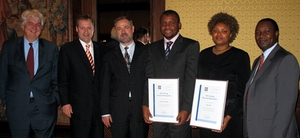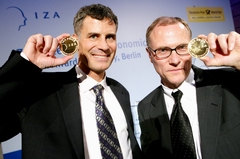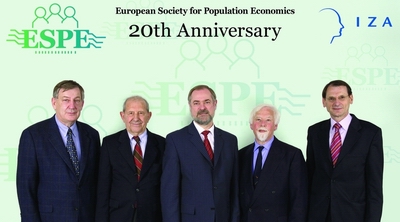| |
|
|
IZA - Electronic Archive
|

|
|
|
|
News Archive |
2014
2013
2012
2011
2010
2009
2008
2007
2006
2005
2004
2003
2002
|
2006 |
| November 2006: |
| |
| |
Although Germany lacks a consistent immigration and integration policy, a recent IZA study finds that the impact of immigrants on public budgets and the welfare system is positive. The study is based on 2004 data from the Socio-Economic Panel (SOEP) for immigrants with foreign citizenship living in Germany.
The results show that immigrants on average paid 2,000 euros more in taxes and contributions during the year than they received in government transfers. Accounting for the lower age structure of immigrants, the calculation shows nonetheless that each foreigner living in Germany will have paid a positive net balance of about 11,600 euros into the public budgets by the end of their lives. Given a foreign population of currently about 7.2 million, the total surplus amounts to 84 billion euros.
This positive effect is generated under the current immigration policy, which is still inadequate from an economic point of view. If Germany were to apply a quota or point system for the selection of immigrants, the economic gains from migration would be even larger. "The IZA calculations send a clear signal to policymakers that the German immigration act should be complemented by a selection mechanism in order to increase the benefits of migration," said IZA Director Klaus F. Zimmermann.
The complete study is downloadable as IZA Discussion Paper No. 2444.
|
| |
| |
Female labor force participation in Germany is still comparatively low by international standards. This is particularly true for women entrepreneurs. While self-employment rates in Germany are generally on the rise, self-employed women account for only about 7 percent of the female workforce. Although employers increasingly value gender diversity, especially as the businesswomen's "gender edge" can generate increased sales and profits, women still remain underrepresented in executive positions. Among the likely causes of low female entrepreneurial rates are women's complex social responsibilities for the immediate and extended family, self-confidence issues, and a general lack of interest in entrepreneurship, which may be related to perceptions of risk.
However, as IZA Senior Research Associate Amelie Constant (Deputy Program Director for Migration) points out in a contribution to AICGS Policy Brief 12, self-employment is a substantially more lucrative employment strategy for women in Germany than the comparable salaried option. Since German businesswomen still choose employment in the more secure salaried sector instead, government programs should be designed to attract women to self-employment and encourage female entrepreneurship.
[Download complete article in PDF]
|
| |
| |

|
left to right: Holzmann, Schmitt (GTZ), Zimmermann,
Fomba Kamga, Ntuli, Ndungu (AERC) |
The second part of the IZA Capacity Building Project in Sub-Saharan countries sponsored by the World Bank and the African Economic Research Consortium (AERC) resulted in the selection of two economics doctoral students to spend six weeks at IZA to work with resident researchers on their dissertations. Miracle Ntuli (University of Cape Town, South Africa) and Benjamin Fomba Kamga (University of Yaounde II, Cameroon) were selected by AERC for their stay at IZA from November 1 until December 15, 2006. Both young researchers already attended the Labor Economics course taught by IZA staff members in June 2006 in Nairobi. The research visit provided the students with the time and space to make significant progress on their dissertations and to get critical feedback on their work from IZA research associates.
The students were recognized at the World Bank Workshop "Job Creation in Africa" held in Frankfurt on November 27–28, 2006. Robert Holzmann (World Bank) and IZA Director Klaus F. Zimmermann presented the two doctoral students with certificates acknowledging their research visit to IZA.
|
|
| October 2006: |
| |
| |
Against the background of high and persistent unemployment, the current labor policy debate in Germany centers on the question of introducing in-work benefits (also termed “combi-wages”) in all sectors of the economy. What is often overlooked is the fact that this form of subsidy can only be effective if the basic level of benefit transfers for the unemployed is reduced at the same time. Such proposals have been made, but the public reaction shows that a political consensus in this area will hardly be achieved. This is why IZA has long advocated a more effective – and also fairer – approach to providing the necessary incentives to take up low-paid employment without touching the existing basic welfare levels.
Known as the "workfare" concept, this alternative is based on the simple principle of reciprocity, or "give-and-take". IZA simulations show that the introduction of workfare could create over 800,000 additional jobs in Germany – much more than any of the wage subsidy models currently discussed. However, policymakers must decide between workfare and in-work benefits; there can be no compromise between the two approaches. So why not choose the better alternative?
Read more about the IZA proposal in the October issue of IZA Compact.
|
| |
| |

|
| Edmund Phelps |
Edmund S. Phelps (Columbia University), IZA Research Fellow since 2001, was awarded this year's Nobel Prize in Economics "for his analysis of intertemporal tradeoffs in macroeconomic policy."
Klaus F. Zimmermann welcomed the decision of the Nobel Committee as a "long-awaited honor for one of the world's top economists," whose research on human capital has important implications particularly for German policymakers. "Phelps has shown that our welfare state cannot continue to exist without future-oriented investment by the state and the individual in education and further training."
[Nobel Prize website]
|
| |
| |
The Bonn Graduate School of Economics, founded in 1998 with support from Deutsche Post World Net, has been selected as one of 18 graduate schools in Germany that will receive funding under the "Excellence Initiative" by the Federal Ministry of Education and the German Research Foundation (DFG). IZA cooperates closely with the Graduate School by organizing joint research seminars, offering courses in labor economics and behavioral economics, and hosting several Ph.D. students as Resident Research Affiliates. "This decision underscores the high quality of the doctoral program in economics at the University of Bonn", said IZA Research Director Armin Falk.
|
| |
| |

|
| Krueger (left) and Card with the IZA Prize Medals |
The IZA Prize in Labor Economics 2006 is awarded to the outstanding American labor economists David Card (University of California, Berkeley) and Alan B. Krueger (Princeton University). According to the IZA Prize Committee, their work has crucially shaped the research agenda in labor economics and has raised the standards for empirical research in applied economics. "David Card and Alan Krueger have stimulated labor economics for many years with their original research approaches, the practical relevance of their results, and their remarkable use of natural experiments to test common hypotheses," said IZA Director Klaus F. Zimmermann during the announcement of the IZA Prize Committee decision in Bonn. "The findings by Card and Krueger are highly relevant for labor market policy in Germany, particularly with regard to raising school quality." The 2006 IZA Prize was awarded by Klaus Zumwinkel, CEO of Deutsche Post World Net and President of IZA, and IZA Director Klaus F. Zimmermann on November 8 during a festive ceremony in Berlin. Deutsche Post World Net has sponsored IZA since the foundation of the institute in 1998. The IZA Prize was established in 2002 and carries a cash award of 50,000 euros. It is considered the most esteemed science award in labor economics worldwide. More information: Award Statement | IZA Press Statement | IZA Prize Homepage | Handelsblatt article (in German)
|
|
| September 2006: |
| |
| |
The introduction of a legally mandated minimum wage in Germany would threaten hundreds of thousands of the so-called "mini" or "midi" jobs, which are low-paid jobs subject to reduced taxes and contributions. The damage to the German economy would be immense, according to a recent IZA study.
The minimum wage regulation would affect only 9% of all full-time and 8% of part-time employees, but nearly 60% of all mini-jobbers. If employers are forced to adjust the wages for this group, many of these jobs would no longer be offered in Germany.
These findings contradict the argument that minimum wages are needed to fight "misery wages". Since mini and midi jobs have become an indispensable instrument to deal with rising labor costs, the establishment of a minimum wage across all industries would be highly counterproductive to the labor market. It would mainly affect women, for which mini jobs have become an ideal opportunity to reconcile family and work.
According to IZA Director of Labor Policy Hilmar Schneider, "policymakers are well-advised to abandon the idea of a general minimum wage. The IZA analysis shows that even a rather low minimum wage would have enormous negative consequences for the German economy. Instead of minimum wages, what we need is more decisive steps towards lower non-wage labor costs."
|
| |
| |

|
| Jens Ludwig |
IZA Research Fellow Jens Ludwig (Georgetown University) has been chosen by the Association for Public Policy and Management (APPAM) to be this year's recipient of the David N. Kershaw Award and Prize.
According to APPAM, the David N. Kershaw award has been established to honor persons who, under the age of 40, have made significant contributions to the field of public policy analysis and management. The award is given once every two years, and Jens Ludwig is the 13th person to receive it. He joins a very distinguished group of scholars that includes, among others, IZA Research Fellow Alan B. Krueger (Princeton University).
|
| |
| |
As an invited speaker at the 60th Congress of German Business Economists on September 18, 2006, IZA Director Klaus F. Zimmermann shared his insights on "Demography, Migration and Corporate Personnel Management". A recent article in the German business daily "Börsen-Zeitung" summarizes the key arguments of his speech. Courtesy of Börsen-Zeitung, IZA makes the full text of the article available (in German language only).
|
| |
| |
For the German business magazine "Capital", IZA has calculated the net balance of welfare transfers received vs. taxes and social security contributions paid by immigrants in Germany. The study is based on 2004 data from the Socio-Economic Panel (SOEP) for immigrants with foreign citizenship living in Germany. The results show that immigrants on average paid 1,840 euros more in taxes and contributions than they received in government transfers. The balance is about 900 euros lower than for the average German, which is largely due to the fact that immigrants earn less and are more prone to unemployment. This gap between foreigners and natives is much smaller for retirees and youths. In the long-term perspective, the positive impact of immigration on the sustainability of the welfare state becomes even more apparent: Over a lifetime, each foreigner living in Germany today will have contributed about 11,000 euros more to the public budgets than he or she has taken out.
This positive effect is generated under the current immigration policy, which is still inadequate from an economic point of view. If Germany were to apply a quota or point system for the selection of immigrants, the economic gains from migration would be even larger.
A summary of the IZA research findings will appear in the October issue of "Capital" [view online version in German].
|
|
| August 2006: |
| |
| |

|
| Jacob Mincer |
With deep regret IZA announces that Jacob Mincer (Professor Emeritus of Economics at Columbia University, New York), one of the most influential economists of modern time, has passed away on August 20 at the age of 84. Jacob Mincer was the founding father of modern empirical labor economics and the inaugural recipient of the IZA Prize in Labor Economics which honored "the life-time achievement of an outstanding scholar and pioneer in labor market research."
Jacob Mincer was born in 1922 in Poland. After escaping the Holocaust, he emigrated to the United States in 1948. He received his Ph.D. from Columbia University, where he remained for most of his career before gaining emeritus status.
Mincer’s efforts in developing the scientific instruments and methods used by today's economists to analyze the problems and prospects of the working world are almost unparalleled. His seminal work highlighted the importance of nurturing human potential and explored the interplay of education, technological progress and earnings. He demonstrated how life-long learning served the best interests of both employees and the organizations that employed them. Mincer's work on women in the workforce and job turnover also remains at the center of modern economic thought. His human capital model is one of the fundamental instruments in today’s empirical economics.
IZA Director Klaus F. Zimmermann praised Jacob Mincer and his large influence on generations of labor economists worldwide: "As the leading institute in labor economics IZA is very grateful for Jacob Mincer’s continuous support and inspiration. We will cherish him and his fundamental contributions in memory." Barry R. Chiswick (University of Illinois at Chicago), IZA Program Director for Migration and a former student of Jacob Mincer, wrote a memorium honoring Mincer's lifetime achievement and his lasting impact on modern labor economics [read the complete text].
|
|
| June 2006: |
| |
| |

|
20 years after - ESPE's first Executive Committee meets again at IZA:
P. Pestieau, G. Schmitt-Rink, K.F. Zimmermann, B.M.S. van Praag, J. Ritzen |
On June 22-24, 2006, European population economists gathered for their 20th annual congress in Verona, Italy. Traditionally this conference is not only concerned with the exchange of research on demographic processes (e.g. marriage, fertility, migration, and mortality) and their political implications, but it includes a variety of related disciplines such as household economics, labor economics, public economics, and health economics. The agenda of this year's meeting with about 250 participants included nearly 200 individual presentations. During the event, ESPE President Patricia Apps (University of Sydney and IZA) and President-Elect Barry R. Chiswick (University of Chicago at Illinois and IZA) presented a recognition plaque to IZA Director and ESPE co-founder Klaus F. Zimmermann "for his inspiration and leadership in creating the European Society for Population Economics and for 20 years of dedicated guidance to ESPE."
During the two decades of its existence, the European Society for Population Economics (ESPE) has developed into a highly renowned and internationally influential scientific association. The Journal of Population Economics, established with the help of the Society, has become one of the leading academic journals in economic science worldwide. IZA hosts the internet homepages of ESPE ( www.espe.org) and the Journal of Population Economics ( www.popecon.org) as well as the editorial office of the Journal.
Prior to the ESPE Meeting 2006, the "founding fathers" of the Society got together at IZA to celebrate the anniversary and discuss the achievements of the past 20 years [read more about the ESPE history].
|
| |
| |

|
| H. Lehmann |
Hartmut Lehmann (University of Bologna), IZA Program Director for Labor Markets in Emerging and Transition Economies, has been elected to the Executive Committee of the Association for Comparative Economic Studies (ACES) for a three-year term. ACES is the largest and most renowned association in the field. Its purpose is to promote scholarly exchange among persons interested in comparative studies of economic systems, planning, and economic development, and to further the growth of systematic knowledge in these areas by facilitating research, instruction, and publication.
|
|
| May 2006: |
| |
| |
A recent study by IZA Senior Research Associate Werner Eichhorst reviews national and international experiences with different combinations of in-work benefits, subsidized employment, statutory minimum wages and implicit minimum wages defined by social assistance provisions. With regard to the current political debate in Germany, it calls for a cautious approach to the introduction of additional minimum wages and more generous in-work benefits combined with an unchanged level of social assistance.
The paper is available in German language only as IZA Discussion Paper No. 2120.
On the same topic, IZA Director of Labor Policy Hilmar Schneider recently commented on JobTV24 [see video stream in German].
|
| |
| |

|
| E. Wasmer |
Etienne Wasmer, Professor of Economics at the Université du Québec à Montréal and IZA Research Fellow since 1999, received the Best Young Economist Award (below age 40), which is awarded annually since 2000 by the influential "Cercle des Economistes" and the daily newspaper Le Monde. The prize was delivered at the French Senate on May 9 by Michel Pébereau, President of the BNP bank, in front of Jean-Marie Colombani, Director of Le Monde, Christian de Boissieu and Jean-Hervé Lorenzi (Directors of the "Cercle des Economistes") and Marie-Béatrice Baudet (Le Monde Economie).
The 36-year-old IZA Fellow shares the award with Thierry Mayer (Université Paris-Sud). Both laureates had been nominees in 2004. This year's new nominees are Helène Rey (Princeton University), Emmanuel Saez (University of California, Berkeley) and IZA Research Fellow Fabien Postel-Vinay (University of Bristol and CNRS).
Past laureates also include IZA Program Director Pierre Cahuc, who received the prize in 2001.
More information:
- "Le Cercle des Economistes" (Homepage)
- "Le Monde" article (PDF, 3.5MB, in French)
|
| |
| |

|
| Organizers: Zimmermann, Bargain, Holzmann, Scarpetta |
International development cooperation must shift its focus towards helping less developed countries create more and better jobs while effectively curbing child labor and other forms of exploitation. In a joint appeal to policymakers in the Western industrialized countries, the World Bank and IZA called for a more forceful approach to fighting mass unemployment in the developing world. In the absence of additional efforts in this field, the goal of reducing poverty and social exclusion would become out of reach. At the same time, South-North migration would continue to increase. This is why employment strategies must be at the core of development assistance. Against this background, IZA and the World Bank have started a new initiative to stimulate cooperation between research institutions, donor organizations, and policymakers in order to strengthen the role of job creation in international aid programs.
This initiative was presented to the public during an international expert conference taking place in Berlin from May 25-27. In her opening remarks, German Development Minister Heidemarie Wieczorek-Zeul pointed out that it is in the own interest of industrial nations to help create better labor market prospects in less developed countries. She warned that more than half of the global labor force is either underemployed or long-term unemployed. This situation may well pose a threat to world peace and security as it affects the lives of over three billion youths under age 25 [view speech manuscript].
Globalization has increased uncertainty for workers in both developed and developing countries. While most economists agree that in the long term there will be gains for everyone, some workers will lose in the short run and must be protected. The need to better understand the effects of globalization on workers and what can be done to compensate those who lose out is even more urgent in developing countries where workers are often poor and public social protection systems underdeveloped.
Another challenge researchers at the conference have discussed is how to think about labor markets in developing countries where unemployment may be considered a sign of relative wealth, in the sense that the unemployed have the means to support themselves while they look for a job. Nearly all poor people in developing countries work because they must in order to survive, but often the jobs pay very little, $1 or $2 per day. The policy dilemma then is not simply about the quantity of job creation, but also about the quality of the newly created jobs.
The conference provided an opportunity for experts to discuss these and other employment challenges in developing countries and establish priorities for further research that can be applied in World Bank and other development cooperation agencies. Applauding the steps that Germany has already undertaken in this direction, the World Bank and IZA asked the industrial nations to support joint research in this field as the basis for effective policy advice.
Please view the complete conference program at www.iza.org/conference_files/worldb2006
More information on this initiative is available at www.iza.org/development
|
|
| April 2006: |
| |
| |
On April 25, 2006, leading economists and migration experts testified in front of the U.S. Senate Judiciary Committee on the economics of migration. IZA Program Director Barry R. Chiswick (University of Illionois at Chicago), IZA Research Fellow Harry J. Holzer (Georgetown University) and IZA Research Fellow Richard B. Freeman (Harvard University) along with Dan Siciliano (Stanford Law School) presented the views of economic science on the highly charged and emotional U.S. debate on immigration. The agenda included high- and low-skilled immigrants, illegal immigrants, foreign students, guestworker programs, and amnesty schemes. The testimony by Chiswick, who has had numerous media appearances with the heating up of the debate on immigration reform, was broadcast on television and quoted by many newspapers across the United States.
[Read the complete testimony]
|
| |
| |

|
| M. Miegel |
Meinhard Miegel, Director of the Institute for Economics and Society (IWG Bonn) was the invited speaker at the IZA Tower Talk on April 26, 2006. His speech and the subsequent discussion with Hilmar Schneider, IZA Director of Labor Policy dealt with the question whether there are limits to economic growth and continued welfare gains in the Western industrialized countries.
Ever since the 1970s, the West has been preoccupied with achieving high growth rates – at the price of debt accumulation, Miegel argued. As a result, economic growth no longer increases our wealth, but only serves to maintain our "façade of prosperity" and secure the status quo in the best possible way. In addition, vast sums are needed to finance the treatment of modern illnesses, military operations, the fight against terrorism and drug trafficking, and the protection of property rights. At the same time, the cohesion of Western societies has been eroding, giving rise to such phenomena as child poverty.
[Read the complete report]
|
| |
| |

|
| A. R. Cardoso |
Ana Rute Cardoso, IZA Senior Research Associate and Deputy Program Director for the IZA research program area "The Future of Labor", has been elected as a member of the Executive Committee of the European Association of Labour Economists (EALE), receiving the largest number of votes. The three other newly or re-elected committee members consist of IZA Research Fellows Regina T. Riphahn (University of Erlangen-Nuremberg), Zvi Eckstein (Tel Aviv University), and Adriana Kugler (University of Houston).
|
|
| March 2006: |
| |
| |
The publication of the 2000th IZA Discussion Paper marks another milestone in this successful series of working papers in labor economics. Founded in 1998, the IZA DP Series has long become the most recognized and influential series in the field. Monthly downloads now average at more than 30,000 hits, not including downloads from the Social Science Research Network ( SSRN), with which IZA has established a fruitful partnership.
While IZA now publishes more than one new paper every day, the DP Series continues to provide a growing audience with high-quality research. This is reflected by the fact that more than half of all IZA papers (excluding the most recent ones of the past 12 months) have already been published, or are forthcoming, in a renowned journal or edited volume. "Since not all authors inform us regularly about the publication status of their papers, it is safe to assume that the actual acceptance rate is much higher", said Mark Fallak, who has coordinated the IZA Discussion Paper Series for the past five years.
Although the paper numbers are assigned in the order of submission, it is not a mere coincidence that the 2000th paper was submitted by IZA Research Fellow John T. Addison (University of South Carolina). The most frequent contributor to the series, Addison has now published a total of 31 IZA Discussion Papers. His co-authors are Claus Schnabel (University of Erlangen-Nuremberg) and IZA Research Fellow Joachim Wagner (University of Lueneburg), one of the most widely cited German economists. A report on their paper entitled "The (Parlous) State of German Unions" will appear in the next issue of the IZA Compact print newsletter.
Visit our Discussion Paper page to search, browse or download any of our more than 2000 papers.
|
| |
| |
The "Migration Topic Week 2006" is a newly initiated gathering of migration scholars at IZA. The idea is to create a new forum of discussions on migration, to provide the opportunities to have useful interaction with both young scholars and established researchers in migration, to have stimulating and provocative meetings, and to pave the way for fruitful collaborations.
This year's "Migration Topic Week", which is organized within the IZA research program on Migration and takes place at IZA on May 13-21, 2006, is bookended by the 2nd Migrant Ethnicity Meeting (MEM) (May 14-16), in conjunction with a meeting of practitioners, and the 3rd Annual Migration Meeting (AM²) (May 20-21).
For more information, see the "Migration Topic Week 2006" page and the IZA press statement (in German).
|
| |
| |

|
| D. Blanchflower |
IZA Research Fellow David Blanchflower (Dartmouth College) has been appointed to the Bank of England's Monetary Policy Committee (MPC) to succeed Steve Nickell (London School of Economics and IZA) in June 2006. The MPC makes the operational decisions on British interest rate policy. It comprises top-level staff of the Bank of England and four outside members with relevant expertise who are appointed by the Chancellor.
As a seat on the MPC is considered to be one of the most important jobs in British economic policy, Chancellor Gordon Brown had launched a worldwide search to fill this vacancy. "I am delighted that Professor David Blanchflower has agreed to join the Monetary Policy Committee. David is a world class labor market economist and brings a wealth of experience and expertise to the Committee," said Brown. The 54-year-old, British-born Blanchflower has lived and taught in the United States since 1989.
|
| |
| |

|
| K. von Dohnanyi |
March 28, 2006 marked the 13th "IZA Tower Talk" taking place in the headquarters building of Deutsche Post World Net in Bonn. The invited speaker, Klaus von Dohnanyi, is Vice Chair of the "Convent for Germany". Analyzing the causes of Germany’s high unemployment rates, he rejected the hypothesis that the country’s role as Europe’s economic laggard is due to a blatant failure to implement the necessary reforms. Although he stressed the need for courageous reforms, von Dohnanyi viewed the historically and internationally unprecedented economic burden resulting from German reunification as the main cause of the unemployment crisis. The fiscal requirements to meet the convergence criteria for the introduction of the Euro further aggravated the problem. [Read the complete report]
|
|
| February 2006: |
| |
| |

|
| E. Lazear |
Edward Lazear, one of the most important IZA Research Fellows has been appointed as chairman of the U.S. President's Council of Economic Advisers. Lazear is Professor of Economics at Stanford University and has been active as a policy adviser in various positions. In 2004, he was awarded the IZA Prize in Labor Economics for his outstanding contributions to this discipline. Having pioneered the field of personnel economics, Lazear is an avid proponent of Germany's system of employee participation. He has spent much time in Germany and visited IZA several times. "We can only applaud the decision of the U.S. Administration to nominate a proven expert on German issues to chair the Council of Economic Advisers. This is certainly beneficial to the future of German-American economic and political relations," commented IZA Director Klaus F. Zimmermann.
|
| |
| |
Promotion of further vocational training is a promising instrument of active labor market policy
An important element of the recent "Hartz" reforms of the German labor market is a complete reorganization of further vocational training programs ("Förderung der beruflichen Weiterbildung" or FbW). The reform proposals have been implemented since early 2003. Under the direction of IZA, a joint research group with DIW Berlin and infas Bonn has conducted the first scientific evaluation of FbW. The study analyzed not only the instrument as such, but also the effects of the reform.
The legal basis of FbW was changed in a number of ways in order to improve the quality of the programs through enhanced competition between service providers, and to establish quality management practices in the job centers. Among other measures, an education voucher was introduced as a new instrument. Another goal was to provide a certification system for service providers and the programs they provide.
In addition to an evaluation of the organizational implementation, the study also contains detailed descriptions and econometric calculations of the FbW effects. A unique feature of the analysis is the differentiation between program types.
The study concludes that the reorganization of FbW – despite well-founded criticism of the instrument – has brought about verifiable improvements and efficiency gains. If long-term rather than short-term effects of FbW participation are analyzed, program participants are shown to have a measurable advantage over non-participants. With increasing certification of service providers, enhanced competition and the resulting process of selection, the integration effects of FbW are likely to improve further.
While the complete analysis is only available in German, the summary is also downloadable in English.
- IZA press statement (in German) (PDF)
- Summary of the findings (in English) (PDF, 12 pages, 460KB)
- Evaluation report - main text (in German) (PDF, 264 pages, 2MB)
- Evaluation report - appendix (in German) (PDF, 345 pages, 4MB)
|
| |
| |

|
| K. F. Zimmermann | R. Brandl | M. T. Clemens |
As of February 1, 2006, Martin Clemens has become IZA Director of Administration. He will take over a number of tasks from former IZA Administrative Director Rainer Brandl, who has retired after five years of successful work at the institute. IZA Director Klaus F. Zimmermann praised Brandl's important contributions to building a powerful infrastructure at IZA. "We owe him a great deal of gratitude for the magnificent support he has constantly provided to our researchers," noted Zimmermann.
Before joining IZA, Martin Clemens held several personnel management positions at Deutsche Post World Net. He was Head of Human Resources at Deutsche Post Consult (1996-1999) as well as Director of Human Resources Management at Deutsche Post Express Europe (1999-2002) and Deutsche Post Mail International (2003-2005). "IZA will certainly benefit from his broad experience as an expert in the areas of HR development, staff management and efficient organization," Zimmermann anticipated.
|
| |
| |

|
| Inside BonnEconLab |
Founded 20 years ago by Nobel Laureate and game theory pioneer Reinhard Selten (University of Bonn), the Bonn Laboratory for Experimental Economics is still one of the world's most prominent institutions of this kind. It is currently headed by IZA Research Director Armin Falk, who is also Professor of Economics at the University of Bonn. Since 1986, the experimental research conducted at BonnEconLab has greatly contributed to correcting the one-sided image of the rationally acting homo economicus. "The combination of game theoretic predictions and experimental testing as promoted by the Bonn Laboratory has become an integral component of economic science," said Armin Falk in recognition of Reinhard Selten's intellectual legacy.
As a well-established subdiscipline of its own, behavioral economics takes psychological aspects into account when predicting, for instance, the decisions made by labor market participants. Congratulating on the anniversary, IZA Director Klaus F. Zimmermann commented, "The analyses performed at the Bonn Laboratory have provided modern economics with important insights. It is no mere coincidence that IZA has established its own research program dedicated to behavioral economics, which perfectly complements Armin Falk's work at the Lab."
|
| |
| |
The impending demographic change forces policymakers as well as corporate personnel planners to undertake substantial adjustments. A shortage of well-trained specialists and executives is likely to evolve in the not too distant future. To what extent are German businesses prepared to face this challenge? What must be done to sustain corporate innovativeness and competitiveness in the light of increasingly scarce human capital?
In collaboration with the international executive search firm Ray & Berndtson, IZA has analyzed the human resources strategies of German firms with respect to demographically caused problems in recruiting executives and highly qualified specialists. According to the IZA study, German businesses are not sufficiently prepared to deal with this development. Their main response is to intensify the competition for well-trained young personnel. This strategy is likely to fail in most cases as the share of high-skilled younger workers will not rise in the near future.
Viable alternatives discussed in the IZA research report include extended employment of older workers, tapping the full potential of female workers, and enhancing foreign recruitment. Each of these strategies, however, depends on the necessary adjustments to be made now. This will require massive efforts on the part of employers.
The research report, available in German language only, is available under the title "Personalpolitische Strategien deutscher Unternehmen zur Bewältigung demografisch bedingter Rekrutierungsengpässe bei Führungskräften" at:
IZA Research Report No. 6 (PDF, 49 pages, 530 KB)
|
| |
| |
In its February 20 issue, the German business daily "Handelsblatt" compares the research output in terms of publications in renowned journals by Germany’s nine most important economic research institutes. According to Handelsblatt, IZA was able to expand its share of publications in the journals selected for the study to 9 percent over the past years. This is a great achievement considering that IZA is the only institute which focuses exclusively on one subdiscipline of economic science.
The Handelsblatt study also finds an "above average productivity per researcher" for IZA. In this category, IZA ranks second behind the Social Science Research Centre Berlin (WZB). The analysis is based on a selection of 42 journals drawn from a survey among German economists. As this selection contains only one journal in the field of labor economics, no more than about one-fifth of all IZA publications were taken into account. In this light, IZA's top ranking position it all the more remarkable.
Further reading:
[complete Handelsblatt article]
[Figure: research institute ranking]
|
| |
| |

|
| B. Chiswick |
Barry R. Chiswick (University of Chicago), IZA Program Director for Migration, has been elected President of the European Society for Population Economics (ESPE) with more than 90 percent of all votes cast by ESPE members. Founded by IZA Director Klaus F. Zimmermann 20 years ago, ESPE is the most prominent international association of researchers exploring the field of population economics. This subdiscipline of economic science has become more important than ever as societies around the world are facing the challenges of demographic change.
|
| |
| |

|
| Kai-Uwe Ricke |
On February 1, 2006, the CEO of Deutsche Telekom, Kai-Uwe Ricke, was the invited speaker at the IZA Tower Talk. In front of a record audience, Ricke spoke on "Innovations for tomorrow's markets - how technology and personnel management must interact in the age of globalization".
According to Ricke, the key challenge for the telecommunications industry in the near future will be the shift from obsolete technology-centered business models towards customer-oriented multimedia service packages. It will be inevitable for the market to focus not only on high-quality technology, but equally on service and flexibility. For the service providers, this means complementing telephone and internet access with custom packages tailored to the changing demands of their customers.
Read the complete report of the 12th IZA Tower Talk.
|
|
| January 2006: |
| |
| |

|
| K. F. Zimmermann | R. Holzmann | O. Bargain |
Launch conference in Berlin: May 25-27, 2006
Despite substantial development aid by the industrialized world, many developing countries are still facing substantial problems, particularly in improving their labor markets. High unemployment rates and the lack of job prospects cause massive poverty among large population groups, which in many cases leads to social exclusion. The established channels of Western development assistance often fail to achieve the intended purpose. This is why initiatives specifically targeted at the labor markets of the developing economies could significantly improve their ability to catch up with the rest of the world.
Against this background, IZA has established a new program area on "Employment and Development" in close cooperation with the World Bank. The key objective is to stimulate high-quality research as well as policy advice in this important field. Interim Program Directors are Robert Holzmann (Director, Social Protection Department, Human Development Network of the World Bank) and IZA Director Klaus F. Zimmermann. Deputy Program Director is Olivier Bargain (IZA).
More detailed information is available on the program area homepage.
IZA invites all researchers to submit relevant papers for presentation at the launch conference of the program area, which will take place in Berlin, May 25-27. Please refer to the conference homepage for details on the program and the submission process.
|
| |
| |

|
| W. B. MacLeod |
In December 2005, IZA Research Fellow W. Bentley MacLeod (Columbia University), Program Director for the IZA research area "Behavioral and Personnel Economics" was elected a Fellow of the Econometric Society, an honorary designation highly valued by members of the economics profession. Also among the 14 most recently elected fellows of the society is IZA Research Fellow James Malcomson (University of Oxford). The Econometric Society is the most prestigious learned society in the field of economics, with a worldwide membership and more than 600 fellows. Its main objective is the advancement of economic theory in its relation to statistics and mathematics.
With the two newly elected of December 2005, the entire IZA network now includes 39 Fellows of the Econometric Society:
George A. Akerlof, Joseph Altonji, Joshua Angrist, Orley Ashenfelter, Gary S. Becker, Roland Benabou, Truman Bewley, Olivier Blanchard, Richard Blundell, George Borjas, David Card, Richard A. Easterlin, Zvi Eckstein, Henry Farber, Robert Gibbons, Daniel S. Hamermesh, James J. Heckman, Werner Hildenbrand, Arie Kapteyn, Alan B. Krueger, Guy Laroque, Richard Layard, Edward Lazear, W. Bentley MacLeod, James Malcomson, Charles F. Manski, Costas Meghir, Benny Moldovanu, Dale T. Mortensen, Marc L. Nerlove, Stephen J. Nickell, John Pencavel, Hashem Pesaran, Edmund S. Phelps, Christopher A. Pissarides, Robert Pollak, Assaf Razin, Bernard Salanié, Eytan Sheshinski.
|
|
| |
|
|
|
|